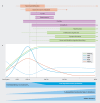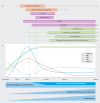Key Messages of the Iodine Deficiency Working Group (AKJ): Maternal Hypothyroxinemia Due to Iodine Deficiency and Endocrine Disruptors as Risks for Child Neurocognitive Development
- PMID: 40771831
- PMCID: PMC12324869
- DOI: 10.1055/a-2505-1944
Key Messages of the Iodine Deficiency Working Group (AKJ): Maternal Hypothyroxinemia Due to Iodine Deficiency and Endocrine Disruptors as Risks for Child Neurocognitive Development
Abstract
Iodine deficiency with the resultant maternal hypothyroxinemia and the effects of endocrine disruptors can, individually or together, have a negative effect on embryonic and fetal brain development. This is the conclusion of a recent review by the authors which examined and critically discussed a total of 279 publications from the past 30 years on the effects of mild to moderate iodine deficiency, reduced maternal thyroxine levels, and the influence of endocrine disruptors on child brain development during pregnancy. Adequate iodine intake is important for all women of childbearing age to prevent negative psychological and social consequences for their children. An additional threat to the thyroid hormone system is the ubiquitous exposure to endocrine disruptors, which can increase the impact of maternal iodine deficiency on the neurocognitive development of their offspring. Ensuring an adequate iodine intake is therefore not only crucial for healthy fetal and neonatal development in general, but could also prevent the potential effects of endocrine disruptors. Due to the current deficient iodine status of women of childbearing age and of children and adolescents in Germany and most European countries, urgent measures are needed to improve the iodine intake of the population. Therefore, in the opinion of the AKJ, young women of childbearing age should be instructed to take iodine supplements continuously for at least 3 months before conception and during pregnancy. In addition, detailed strategies for detecting and reducing exposure to endocrine disruptors in accordance with the "precautionary principle" should be urgently developed.
Keywords: endocrine disruptors; hypothyroxinemia; iodine deficiency; neurocognitive development; pregnancy.
The Author(s). This is an open access article published by Thieme under the terms of the Creative Commons Attribution-NonDerivative-NonCommercial-License, permitting copying and reproduction so long as the original work is given appropriate credit. Contents may not be used for commercial purposes, or adapted, remixed, transformed or built upon. (https://creativecommons.org/licenses/by-nc-nd/4.0/).
Conflict of interest statement
Conflict of Interest The authors declare that they have no conflict of interest. Interessenkonflikt Die Autorinnen/Autoren geben an, dass kein Interessenkonflikt besteht.
Figures




References
-
- Eastman CJ, Zimmermann MB. South Dartmouth (MA): MDText.com, Inc.; 2000. The iodine deficiency disorders.
LinkOut - more resources
Full Text Sources
Miscellaneous

